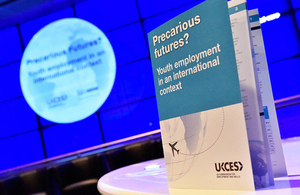Small jobs make a big difference - but young people struggle to find them
New report 'Precarious futures? Youth employment in an international context' highlights young people have crucial need for experience.

Precarious Futures report launch
Young people in the UK need more help getting the vital experience needed to find work, or risk falling behind their international counterparts, a report published today claims.
Calling on business, education and government to do more to give young people opportunities to ‘earn and learn’, the report notes that youth unemployment in the UK is falling, but claims there is still more work to be done to give young people the best chance of getting into the workplace.
‘Precarious Futures? Youth employment in an international context’, published today by the UK Commission for Employment and Skills (UKCES), notes that across Europe only the UK saw a fall in the number of young people combining work with learning in the years leading to recession.
But the report finds that countries with high numbers of young people who work while studying have lower levels of youth unemployment as a result.
In Australia just under half (44%) of 15 to 19-year-olds in education are on apprenticeships or have part-time jobs. Later on, just 12% of their 20 to 24-year-olds are not in education, employment or training (NEET).
By contrast, in the UK just 22% of young people aged 15 to 19 are earning and learning - that is, combining part-time work with full-time education, or taking on an apprenticeship - and nearly one in five (19%) 20 to 24 year olds are categorised as NEET.
Fiona Kendrick, CEO and Chairman of Nestlé UK and Ireland and a UKCES Commissioner, said:
The youth employment challenge we face in the UK is relatively unique compared to other countries. Too many young people aren’t making a successful transition from education into work. They risk falling in and out of short-term jobs - or in some cases not entering the job market at all - and losing the opportunity to develop careers.
At Nestlé we have recognised the need to focus on skills for future growth. I want to call on employers to offer young people the opportunity to learn practical skills, understand how industry works, and gain experiences that are relevant for business.
The report also states that the number of unemployed 16-24s in the UK has steadily fallen in recent years, but that the UK’s youth unemployment rate is more than three times higher than the adult rate.
This ratio is higher than most other European countries, and has also been increasing for the last 25 years – showing there is still much to be done to tackle the issue of youth unemployment in the UK.
Minister for Employment Esther McVey MP said:
Helping young people to get their foot in the door and build their careers is a major priority for this government. Young people have a huge amount of potential to offer future employers and just need the chance show what they are made of.
With the number of young people in jobs going up and youth unemployment falling, we will continue to work with businesses to create opportunities for young people so they can get the skills and experience they need to secure their future.
Michael Davis, chief executive of UKCES, said:
This report finds that the majority of employers are happy with their young recruits. Those who aren’t happy say the main reason is lack of experience. Yet only 27% of employers currently offer work experience.
Small jobs make a big difference for young people. Opportunities to earn and learn – either through work experience, apprenticeships or part-time jobs – give young people the kind of experience that employers value.
View the report in full. For previous UKCES publications on youth employment visit the UKCES youth employment reports collection.